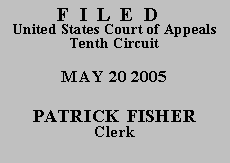

| UNITED STATES OF AMERICA,
v.
JULIO ARMANDO REYNAGA-CORTES , |
|
Before SEYMOUR, LUCERO, and O'BRIEN,
Circuit Judges.
Julio Reynaga-Cortes pled guilty to possession with intent to distribute 100
kilograms or more of marijuana and aiding and abetting possession with intent to
distribute. See 21 U.S.C. 841(a)(1) and 841(b)(1)(B); 18 U.S.C. 2. He
sought and was denied a downward adjustment based on the safety valve
provision, United States Sentencing Commission, Guidelines Manual, 5C1.2
(Nov. 2003).(1) The Government argued
Reynaga-Cortes twice was untruthful
"about aspects of what he was saying" during his debriefing and "ultimately he
indicated that he was fearful of the other people involved, and did not want to
talk about the co-defendants." (Appellant Br. Att. B at 2.) The district court
found Reynaga-Cortes did not provide the information necessary to qualify for
the adjustment. Exercising jurisdiction pursuant to 18 U.S.C. § 3742, we affirm.
On appeal, retained counsel, pursuant to Anders v. State of California, submitted a brief and seeks to withdraw asserting there are no grounds to challenge the district court's denial of a downward adjustment and there exists no other non-frivolous issues for appeal. 386 U.S. 738 (1967). Under Anders, we must conduct "a full examination of all the proceedings, to decide whether the case is wholly frivolous." Id. at 744. After carefully reviewing the record, we find the district court did not err in denying the downward adjustment and no non-frivolous issues exist.(2)
In addition to the Anders brief, Reynaga-Cortes filed a pro se letter in which he asks for a second chance. However, he raises no cogent argument or legal authority regarding the actions of the district court.
Counsel's request to withdraw is GRANTED and the judgement and sentence are AFFIRMED.
Entered by the Court:
Terrence L. O'Brien
United States Circuit Judge
*. This order and judgment is not binding precedent except under the doctrines of law of the case, res judicata and collateral estoppel. The court generally disfavors the citation of orders and judgments; nevertheless, an order and judgment may be cited under the terms and conditions of 10th Cir. R. 36.3.
1.USSG 5C1.2 authorizes the district court to impose a sentence according to the guidelines without regard to a statutory minimum sentence if the court finds the defendant meets certain qualifications. One of the qualifications provides that the defendant, not later than the time of the sentencing hearing, truthfully provides all information related to the offense or offenses that were part of the same course of conduct. See USSG 5C1.2(a)(5).
2.The recent Supreme Court decision in U.S. v. Booker, ___ U.S. ___, 125 S.Ct. 738 (2005), does not impact the safety valve provision. United States v. Payton, 2005 WL 1030462 (10th Cir., May 4, 2005).